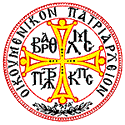 Mistaken Mistaken
I thought this was going to be the last entry in
this category. Then, I received this great little book for Christmas. It is a collection of
letters and stories of priests (mostly AngloCatholic) and other Anglicans who
have converted to Orthodoxy. I highly recommend the entire book, and could go
wild with quotes. Of course, it wouldn't take long to violate the fair use
provisions of copyright law. So, I'll just settle for a couple. The reasons I
like them is that they capture much of the thought processes I had to address.
They aren't necessarily the gentlest statements. The authors try, but there is
no gentle way to tell someone else they might be in the wrong place. So, here
is a quote from Fr. Olnhausen, a priest in
Wisconsin:"My chief message to
my dear Anglican friends is that we're alive and well and enthusiastic about
living in the Holy Orthodox Church. I wish you were here, too. I respect and
admire those of you who are suffering and fighting for the Faith in the
Episcopal Church. For purposes not clear to me, God may have some reason for
keeping you there. Who am I to pass
judgment?But isn't it
obvious that Anglicanism itself has failed? Why do you want to preserve a
system that has become a hindrance to the Faith? Instead of being consumed by
trying to defend yourself from a jaded, increasingly post-Christian Anglicanism,
you could be working to convert people to Orthodoxy, to a Church which defends
and supports her members in the
Faith."Then, the following, from
Fr. Reeves, a priest in
Texas:"The theological
liberalism of the seminary was not the only difficulty for me. Another deeply
disturbing fact was that Anglicanism, unlike the other major Churches of the
Reformation, was not a confessional body. It had no Book of Concord, no
Westminster Confession. Culture was its glue; the via media (the middle road)
its hermeneutic. The Creed was but a relative statement of faith. A Church
which allowed a Bishop Pike to function with a mere censure after denying the
Virgin Birth, the Trinity, and the Resurrection was a Church which was more
concerned about compromise than
truth...The Elizabethan
Settlement still prevailed, whether the matters were political, doctrinal, or
moral. Revelation, at least Anglican-style, was culturally determined. As the
culture continued to decline, so did Anglicanism's message. Abortion,
homosexuality, and inclusive language all determined the content, since the
Church had to let the world set the agenda for her. The Anglican ethos was
founded on a matter of political correctness in the sixteenth century. For me
it became painfully obvious that political correctness remained its dominant
feature four hundred years later."
Posted: Thursday - January 04, 2007 at 11:12 PM
|
Quick Links
Statistics
Total entries in this blog:
Total entries in this category:
Published On: Mar 11, 2009 11:48 AM
|